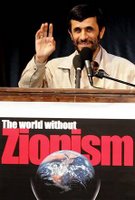 In an article published a little over a year ago [9/5/05] Amir Taheri pointed out that in 1998 "a pirated translation of Samuel Huntington's "The Clash of Civilizations and the Remaking of the World Order" appeared in Tehran. To the publisher's surprise half the print run (1,000 copies) was bought by the Islamic Revolutionary Guard. Among those who received a copy was Yahya Safavi, now commander in chief of the Guards, and Mahmoud Ahmadinejad, now president of the Islamic republic. According to Taheri "Iran wants to reshape the Middle East in its own image" and in particular it intends to confront the United States over hegemony in the Middle East. Taheri believes that the election of Ahmadinejad as President marks a major shift in power from the clergy to the Revolutionary Guards. In a kind of "creeping coup d'etat" the Guards built an impressive grass-roots network throughout Iran with two political-front organizations: the Usulgara (fundamentalists) and the Itharis (self-sacrificers), each attracting a younger generation of military officers, civil servants, managers and intellectuals. In 2002, the network captured the Tehran city council and elevated Ahmadinejad as mayor. Two years later he emerged as the Guards' presidential candidate, besting former president Ali Akbar Hashemi Rafsanjani. Taheri presented this election as the beginning of the end of the clerics' dominance.
In an article published a little over a year ago [9/5/05] Amir Taheri pointed out that in 1998 "a pirated translation of Samuel Huntington's "The Clash of Civilizations and the Remaking of the World Order" appeared in Tehran. To the publisher's surprise half the print run (1,000 copies) was bought by the Islamic Revolutionary Guard. Among those who received a copy was Yahya Safavi, now commander in chief of the Guards, and Mahmoud Ahmadinejad, now president of the Islamic republic. According to Taheri "Iran wants to reshape the Middle East in its own image" and in particular it intends to confront the United States over hegemony in the Middle East. Taheri believes that the election of Ahmadinejad as President marks a major shift in power from the clergy to the Revolutionary Guards. In a kind of "creeping coup d'etat" the Guards built an impressive grass-roots network throughout Iran with two political-front organizations: the Usulgara (fundamentalists) and the Itharis (self-sacrificers), each attracting a younger generation of military officers, civil servants, managers and intellectuals. In 2002, the network captured the Tehran city council and elevated Ahmadinejad as mayor. Two years later he emerged as the Guards' presidential candidate, besting former president Ali Akbar Hashemi Rafsanjani. Taheri presented this election as the beginning of the end of the clerics' dominance. He is the first non-mullah to become president since 1981. The holder of a Ph.D., he is also the best educated of the six Islamic presidents so far. His humble background and populist discourse have won him a genuine base, especially among the poor who feel let down by corrupt religious leaders.
That's the good news. The bad news is that, if anything, he can be expected to be a far more formidable enemy of the West--and of America in particular.
In August 2005, General Safavi declared before an audience of senior naval officers that Iran's mission was to create "a multipolar world in which Iran plays a leadership role" for Islam. Ahmadinejad at about that time declared that Iran's foreign policy is nothing less than "a government for the whole world" under the leadership of "the Mahdi," the Absent Imam of the Shiites. He regards the United States as being in its "last throes" and will be replaced by the Islamic republic. Geopolitical dominance in the Middle East, says Ahmadenijad, is"the incontestable right of the Iranian nation." Khamenei has said in a speech, "The Americans have their so-called Greater Middle East plan." "We, too, have our plan for the region."
Taheri predicted a year ago, that "the stage is set for a confrontation with the United States." Militant Islamists remember what most Americans forgot: that in 1980 the United States did nothing much when its embassy in Tehran was seized by students, that the Americans retreated from Lebanon after suicide bombers recruited by Tehran killed 241 Marines near Beirut in 1982; and that Bill Clinton did nothing more than fire rockets into Afghanistan after the attacks on American embassies in Nairobi and Dar es-Salaam. Taheri said the prospects for resolving the nuclear standoff are not good. Iran is convinced America will soon depart the region. "The strategy will most likely be to wait Bush out, stalling on the negotiations while bleeding America to the maximum in Iraq and Afghanistan, working to prevent a settlement in Palestine and sabotaging U.S. hopes for a democratic Middle East."
That prediction is now a year old. So far, pretty good augury.
A Clash of Civilizations
By AMIR TAHERI
Published: September 5, 2005 (Newsweek)
Eight years ago a pirated translation of Samuel Huntington's celebrated essay "The Clash of Civilizations and the Remaking of the World Order" appeared in Tehran. The publisher received an order for 1,000 copies, half the print run. "We wondered who wanted them," recalls Mustafa Tunkaboni...
more…
No comments:
Post a Comment